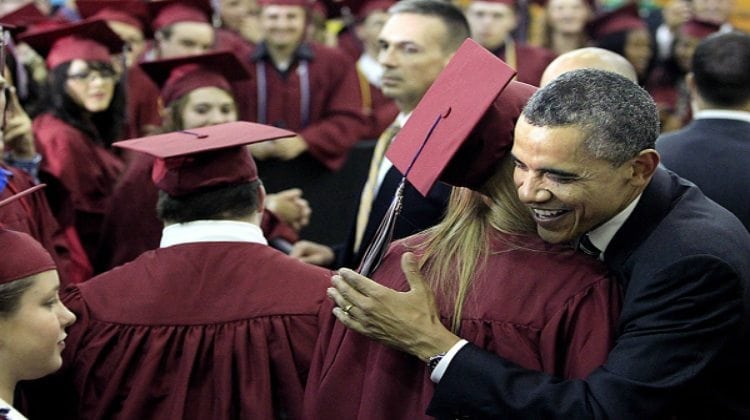Obama Is Not Helping Student Loan Crisis
A lot of people are under the misconception that expanding a student loan forgiveness program will actually alleviate the student loan crisis, but it really does nothing to fix the issue.
Obama may have signed an executive order bypassing congress in order to expand the student loan forgiveness program known as “Pay As You Earn”, but that really brings no benefit to current or potential borrowers, it just increases the national debt, and taxes for the average joe.
This “Pay-As-You-Earn” program is partly about lowering the monthly payments to make student loans more affordable for graduates, but mostly it is the foot in the door to student loan forgiveness, which sounds like a dream come true, but it isn’t for everyone.
Under the latest version of President Obama’s giveaway to former college students, people with student loans that meet certain income eligibility standards will only need to pay 10%of their discretionary income for a maximum of 20 years.
Discretionary income is the amount you earn above the poverty line for your family size. If a borrower works for a government or in a job defined as public service, they only have to pay for 10 years. After that, the remaining balance is “forgiven”.
In an extreme case, a person could pile up over $100,000 in student loans going to an expensive school, graduate, and go to work for a non-profit advocacy group with 501(c)(3) status in New York City.
Then let’s pretend that our graduate stays single and is paid $40,000 a year. She will pay only about $187 per month which will not even cover the interest accruing on her loans.
If she stays employed in public service for ten years, her loan balance will be forgiven at a point when she actually owes more than the original $100,000 balance because the payments were so low that the loan had negative amortization.
In fact, over ten years, our imaginary student will have paid only slightly more than $22,000 to a government that gave her $100,000 to help pay for college.
The federal government already subsidizes college through direct federal funding to schools, Pell Grants to students, and below-market interest rates on student loans.
This loan forgiveness program increases the federal subsidy of college education to a whole new level.
This enormous expansion of federal government largess is unnecessary and incredibly unfair.
Unfair to whom? Well to the rest of the people who chose a career outside the public service.
Honestly, why should taxpayers—many of whom have not gone to college—have to subsidize people who are likely to have above average earnings?
Second, why is the federal government providing larger subsidies to people pursuing careers that are in less demand in the marketplace?
It is possible to make an argument for government making student loans if the free market won’t extend credit to student who have no collateral to pledge, but such a market failure argument rests on the assumption that, if made, the loans can be repaid. If students cannot repay the loans, there was no market failure and the government has no place in making the loans. If government wants to subsidize college education it could simply directly subsidize it rather than making loans that are designed to be forgiven.
Worse, why are low pay, government, and public service jobs doubly rewarded?
To an extent, society judges the worth a different jobs by the earnings of those performing them.
That does not mean that low-paying jobs do not have worth, but if we needed more people doing those jobs, the price (earnings) would rise.
Nurses are in short supply so a nurse can earn over $100,000 per year in any major city.
Certified welders can earn $75,000 per year or more because employers cannot find enough of them.
Today most government jobs pay more than private sector jobs, so why would borrowers working for the government be given more favorable terms?
President Obama needs to get up to speed on the facts about relative compensation in the labor market.
The idea behind the “Pay-As-You-Earn” program appears to be that the government can judge who is deserving of a bigger college education subsidy.
Do we really believe that the government is better than the market at determining which careers benefit society?
After all, somebody advocating controversial positions than many taxpayers disagree with could be eligible to have over $100,000 in loans forgiven while somebody performing medical research to cure cancer might not because they are earning too much money.
Student loans are rapidly expanding past the $1.2 trillion mark in total outstanding balances. President Obama sees this enormous sum as an opportunity to expand income redistribution. Unless somebody can make a cogent argument why taxpayers should not only subsidize college students but subsidize more heavily those whose educations are not yielding an economic payback, this program makes no sense.
Rather than inventing new ways to forgive student loan debt, perhaps the Obama administration could think of ways to not lend so much money to students will be unable to repay. After all, that is how every other type of loan works.

Leave a Reply